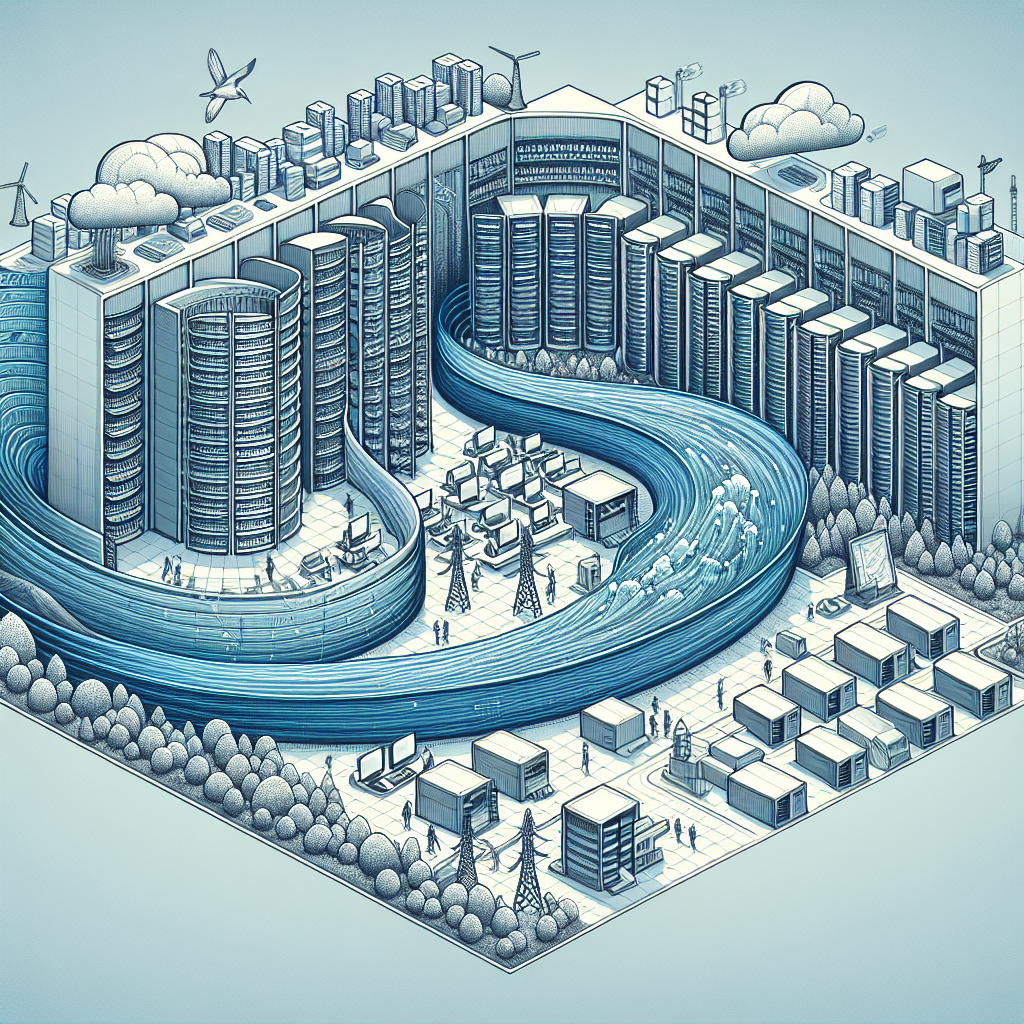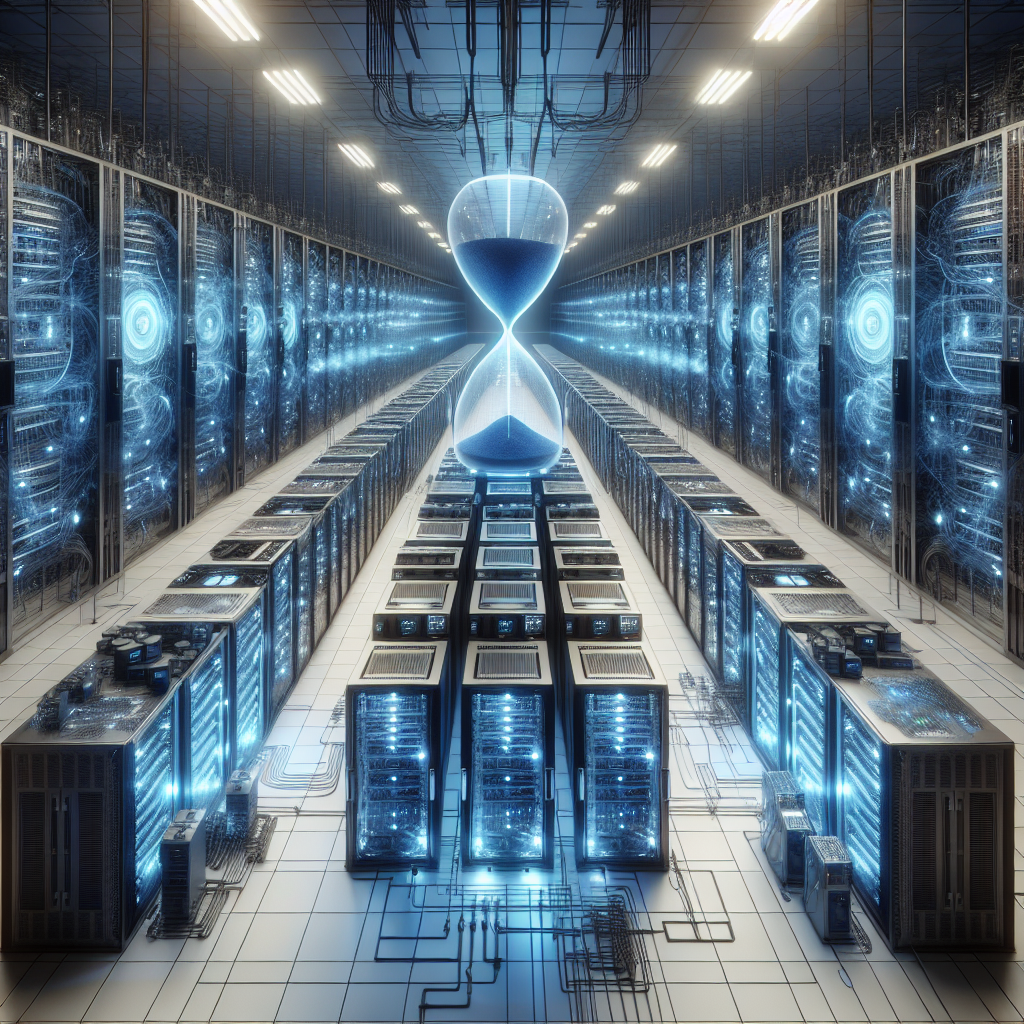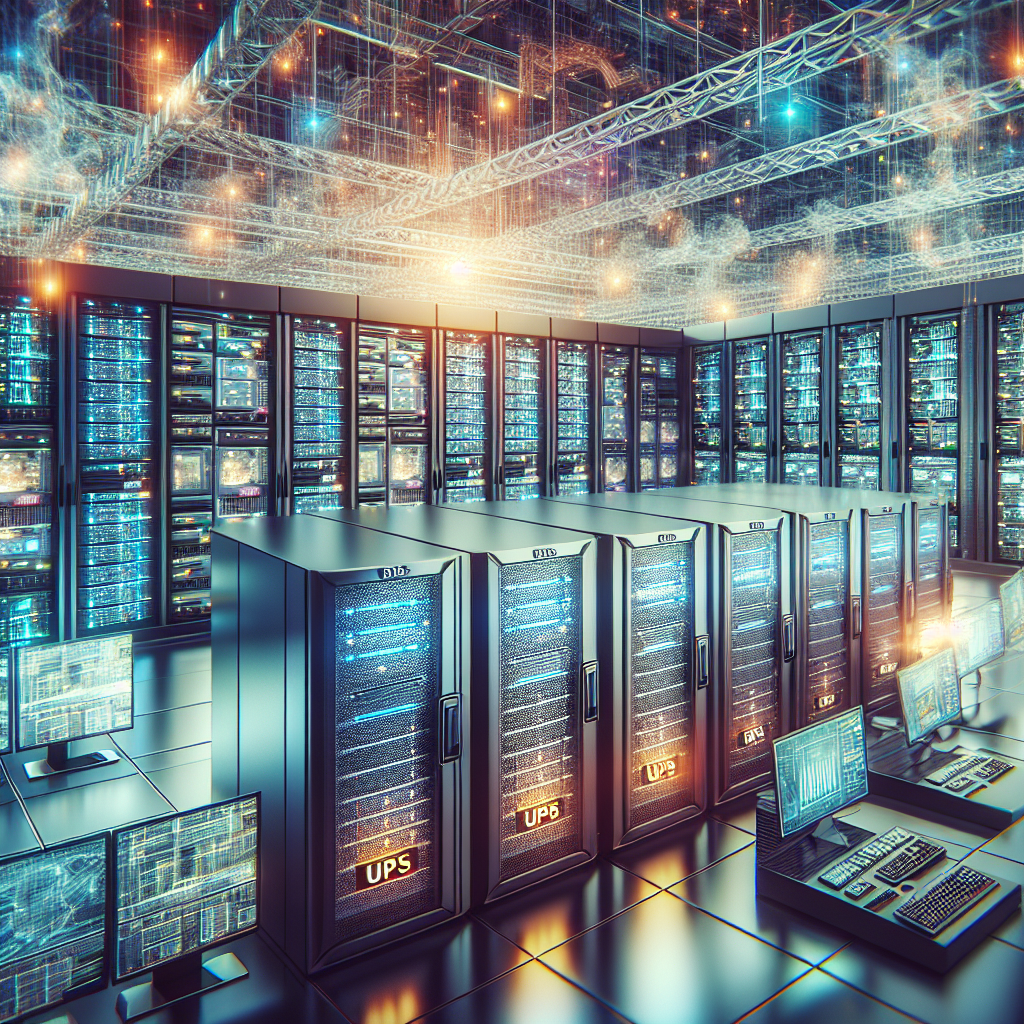Your cart is currently empty!
Tag: Business

Ensuring Business Continuity in Data Centers: Strategies and Best Practices
In today’s digital age, data centers are the backbone of any organization’s operations. They house critical information, applications, and infrastructure that are essential for the day-to-day functioning of businesses. As such, ensuring business continuity in data centers is paramount to the success and longevity of any organization.Business continuity refers to the ability of an organization to continue operating in the face of disruptions, whether they be natural disasters, cyber attacks, or human error. In the context of data centers, this means implementing strategies and best practices that minimize downtime, ensure data integrity, and maintain operations even in the event of unforeseen events.
One of the key strategies for ensuring business continuity in data centers is implementing a robust disaster recovery plan. This plan should outline procedures for backing up data, restoring systems, and resuming operations in the event of a disaster. Regular testing and updating of the disaster recovery plan is also crucial to ensure its effectiveness when needed.
Another important aspect of business continuity in data centers is redundancy. This involves having backup systems, power sources, and network connections in place to ensure that operations can continue even if one component fails. Redundancy can be costly, but the cost of downtime and lost data far outweighs the initial investment in redundant systems.
Regular maintenance and monitoring of data center infrastructure is also essential for ensuring business continuity. This includes conducting regular inspections, performing software updates, and monitoring system performance to identify potential issues before they escalate into major problems.
In addition to these strategies, data centers should also have a comprehensive security plan in place to protect against cyber threats and unauthorized access. This may include implementing firewalls, encryption, access controls, and regular security audits to ensure the integrity of data and systems.
Overall, ensuring business continuity in data centers requires a proactive approach that includes disaster recovery planning, redundancy, regular maintenance, and robust security measures. By implementing these strategies and best practices, organizations can minimize downtime, protect critical data, and ensure that their operations continue uninterrupted in the face of disruptions.

The Importance of Data Center Disaster Recovery: Ensuring Business Continuity in Times of Crisis
In today’s digital age, data is the lifeblood of any business. From customer information to financial records, organizations rely heavily on their data to operate efficiently and effectively. However, in the event of a disaster, such as a natural disaster or cyber attack, this critical data can be at risk. This is where data center disaster recovery comes into play.Data center disaster recovery is the process of restoring and recovering data and IT infrastructure in the event of a disaster. It involves creating a plan and implementing strategies to ensure that critical data is protected and can be quickly restored in the event of a crisis.
Ensuring business continuity in times of crisis is essential for any organization. A data center disaster recovery plan helps businesses minimize downtime and ensure that operations can continue even in the face of a disaster. This not only protects the organization’s data but also its reputation and bottom line.
There are several key reasons why data center disaster recovery is important for businesses:
1. Minimize downtime: Downtime can be costly for any business. By having a data center disaster recovery plan in place, organizations can minimize downtime and ensure that critical systems and data can be quickly restored.
2. Protect data: Data is one of the most valuable assets for any organization. A data center disaster recovery plan helps protect this data and ensures that it can be recovered in the event of a disaster.
3. Ensure compliance: Many industries have strict regulations in place regarding data protection and security. A data center disaster recovery plan helps organizations comply with these regulations and avoid potential fines and penalties.
4. Maintain customer trust: In the event of a disaster, customers expect businesses to continue operating and providing services. By having a data center disaster recovery plan in place, organizations can maintain customer trust and confidence.
5. Reduce risk: By proactively planning for disasters, organizations can reduce the risk of data loss and minimize the impact of a crisis on their operations.
In conclusion, data center disaster recovery is essential for ensuring business continuity in times of crisis. By creating a plan and implementing strategies to protect and recover critical data, organizations can minimize downtime, protect their data, ensure compliance, maintain customer trust, and reduce risk. Investing in data center disaster recovery is not only a smart business decision but also a necessary one in today’s fast-paced and digital world.

The Importance of Data Center Backup and Recovery: Ensuring Business Continuity
In today’s digital age, data is at the heart of every business operation. From customer information to financial records, organizations rely on data to make informed decisions and drive growth. With the increasing volume of data being generated every day, it has become more important than ever for businesses to have a robust data center backup and recovery plan in place to ensure business continuity.Data center backup and recovery is the process of creating duplicate copies of data and storing them in a secure location to protect against data loss. This is crucial for businesses of all sizes, as data loss can have serious consequences, including financial loss, damage to reputation, and even legal implications. A data center backup and recovery plan ensures that in the event of a disaster, such as a cyber-attack, natural disaster, or human error, businesses can quickly recover their data and resume operations.
There are several key reasons why data center backup and recovery is essential for ensuring business continuity. One of the main reasons is the risk of data loss. With the increasing prevalence of cyber-attacks and malware, businesses are at a higher risk of losing their data to hackers or malware. A data center backup and recovery plan can help mitigate this risk by providing businesses with a secure and reliable way to recover their data in case of an attack.
Additionally, natural disasters, such as floods, fires, and earthquakes, can also pose a threat to data security. By having a data center backup and recovery plan in place, businesses can ensure that their data is protected and can be quickly recovered in the event of a disaster.
Another key reason for having a data center backup and recovery plan is compliance with regulations and industry standards. Many industries have strict regulations regarding data protection and privacy, and failing to comply with these regulations can result in hefty fines and legal consequences. By having a data center backup and recovery plan in place, businesses can ensure that they are meeting these requirements and protecting their data from unauthorized access.
In conclusion, data center backup and recovery is crucial for ensuring business continuity and protecting against data loss. By implementing a robust backup and recovery plan, businesses can safeguard their data, mitigate the risk of cyber-attacks and disasters, and comply with regulations. Investing in data center backup and recovery is an essential step for any business looking to protect their data and ensure their continued success in the digital age.

The Importance of Data Center Servers in Modern Business Operations
In today’s digital age, data has become one of the most valuable assets for businesses. From customer information to financial records, companies rely on data to make informed decisions and drive growth. As a result, the importance of data center servers in modern business operations cannot be overstated.Data center servers play a critical role in storing, processing, and managing vast amounts of data for organizations. These servers act as the backbone of a company’s IT infrastructure, enabling seamless communication and collaboration among employees, customers, and partners. Without efficient data center servers, businesses would struggle to access and utilize their data effectively, hindering productivity and innovation.
One of the key benefits of data center servers is their ability to ensure data security and integrity. Data centers are equipped with advanced security measures, such as firewalls, encryption, and access controls, to protect sensitive information from unauthorized access or cyber threats. By storing data on secure servers, businesses can minimize the risk of data breaches and safeguard their reputation and bottom line.
Moreover, data center servers offer scalability and flexibility to accommodate the evolving needs of businesses. As companies grow and expand, they can easily scale up their server capacity to handle increasing data volumes and traffic. This scalability allows businesses to adapt to changing market conditions and stay competitive in a fast-paced business environment.
Another significant advantage of data center servers is their reliability and high performance. Data centers are designed to deliver uninterrupted power supply, cooling, and network connectivity to ensure optimal server performance. This reliability is crucial for businesses that rely on real-time data processing and analytics to make critical business decisions.
Furthermore, data center servers enable businesses to leverage cloud computing and virtualization technologies to streamline operations and reduce costs. By hosting their data on cloud servers, companies can access their data from anywhere, at any time, and on any device. This flexibility allows employees to work remotely, collaborate effectively, and enhance productivity.
In conclusion, data center servers are essential for modern business operations. They provide the foundation for storing, processing, and managing data efficiently, securely, and reliably. By investing in advanced data center servers, businesses can unlock new opportunities for growth, innovation, and competitive advantage in today’s digital economy.

The Importance of Data Center Generators in Ensuring Business Continuity
In today’s digital age, data has become the lifeblood of businesses. From customer information to financial records, companies rely on data to make critical decisions and drive their operations. With this increasing reliance on data, ensuring its availability and integrity is more important than ever. One key aspect of this is ensuring business continuity, which refers to the ability of a business to continue operating in the event of a disruption.One of the key components of ensuring business continuity is having a reliable power source. Data centers, which house and manage the servers and infrastructure that store and process data, are particularly vulnerable to power outages. These outages can be caused by a variety of factors, including natural disasters, equipment failures, or even human error. When a data center loses power, it can result in data loss, downtime, and potentially significant financial losses for a business.
This is where data center generators come into play. Data center generators are backup power systems that are designed to kick in automatically in the event of a power outage. These generators are typically powered by diesel fuel or natural gas and can provide uninterrupted power to data centers for extended periods of time. By ensuring that data centers have a reliable backup power source, businesses can minimize the risk of data loss and downtime, and ensure that their operations continue running smoothly even in the face of unexpected disruptions.
In addition to providing backup power during outages, data center generators also play a crucial role in maintaining the overall reliability and availability of data centers. By ensuring that data centers have a steady and reliable source of power, generators help to prevent data corruption, equipment damage, and other issues that can arise from sudden power fluctuations. This, in turn, helps to ensure that businesses can continue to access and rely on their data without interruption.
Overall, data center generators are a critical component of ensuring business continuity in today’s data-driven world. By providing a reliable backup power source, generators help to mitigate the risks of data loss, downtime, and financial losses that can result from power outages. Investing in a robust backup power system is a key step in safeguarding the availability and integrity of data, and ensuring that businesses can continue to operate smoothly and efficiently, no matter what challenges may arise.

The Importance of Data Center UPS Systems in Ensuring Business Continuity
In today’s digital age, data centers play a crucial role in storing, processing, and managing vast amounts of information for businesses. With the increasing reliance on technology for everyday operations, the importance of data center UPS systems in ensuring business continuity cannot be overstated.UPS, or uninterruptible power supply, systems are critical components of data centers that provide backup power in the event of a power outage or disruption. This is essential for maintaining the availability and reliability of critical IT infrastructure and preventing costly downtime.
One of the main reasons why UPS systems are so important in data centers is their ability to provide seamless power protection and backup during unexpected power failures. Power outages can occur due to a variety of reasons, such as severe weather, equipment failure, or human error. Without a UPS system in place, data centers risk losing power and potentially losing critical data and services.
In addition to protecting against power outages, UPS systems also help regulate power quality and prevent fluctuations in voltage that can damage sensitive IT equipment. By providing a consistent and clean power supply, UPS systems help ensure the longevity and reliability of data center infrastructure.
Furthermore, UPS systems play a crucial role in ensuring business continuity by minimizing downtime and maintaining operations during power disruptions. Downtime can be extremely costly for businesses, leading to lost revenue, decreased productivity, and damage to reputation. By having a reliable UPS system in place, data centers can continue to operate seamlessly and meet the demands of customers and stakeholders.
It’s important for businesses to invest in high-quality UPS systems that are designed to meet the specific needs of their data center infrastructure. This includes considering factors such as capacity, runtime, scalability, and redundancy to ensure optimal performance and protection.
In conclusion, the importance of data center UPS systems in ensuring business continuity cannot be underestimated. By providing backup power, regulating power quality, and minimizing downtime, UPS systems play a critical role in maintaining the availability and reliability of data center operations. Businesses that prioritize the implementation of UPS systems can safeguard their IT infrastructure, protect critical data, and ensure seamless operations in the face of power disruptions.
